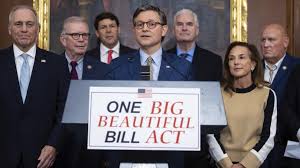This just in: despite Trump’s warnings to GOP legislators on cutting benefits to Medicare and Social Security recipients, GOP legislators are reportedly considering cuts on both. They have already discussed cuts to Medicare, which is why an anguished woman cried out to Joni Ernst, “People will die.”
NBC News noted on June 9th that the Republicans, including Trump, are now looking for more spending cuts to limit how much debt the U.S. takes on to give tax cuts to those who don’t need it.
Looking at new ways to pay for their massive bill Republicans are exploring ideas to slash “waste, fraud and abuse” in Medicare, several senators said on June 8. And President Donald Trump has blessed the pursuit, the senators said. “I think anything that can be — that’s waste, fraud and abuse are open to, obviously, discussions,” Senate Majority Leader John Thune, R-S.D., told reporters.
Politicians, the business community, and economists all agree that the current GOP “Big Beautiful Bill” is a fiscal deficit nightmare. Here’s what London’s Financial Times had to say. (Caution: there is a paywall here.)
https://www.ft.com/content/956bbafb-acf3-48eb-8b26-5a8eff1ff58f
“Analysis by independent bodies such as the non-partisan Committee for a Responsible Budget and the University of Pennsylvania’s Wharton School finds that the bill will add $3.3tn to US debt over the next 10 years. This means the debt-to-GDP level of the world’s largest economy would jump from 98 per cent to 125 per cent by the end of the period — a level well in excess of the previous high, reached in the aftermath of the second world war.”
Remember that “tax cuts” are the primary reason why spending cuts are necessary. But tax cuts for whom?
In the early hours of May 22, 2025, after an all-night session when numerous last-minute changes were made, the U.S. House of Representatives voted to extend the 2017 Tax Cuts and Jobs Act that expires on December 31. Both in 2017 and 2025, the tax cut legislation that disproportionately benefited corporations and the wealthy passed with only Republican votes. This time, however, Republicans voted to partially pay for the ten-year, over $4 trillion tax breaks with $1.6 trillion in federal spending reductions. Around $1 trillion of these reductions would come from raising health care costs and reducing coverage for everyday Americans, with only 3.5 percent of Medicaid cuts from eliminating legitimate waste, fraud, and abuse.
As Perplexity AI notes: “Tax cuts for the rich are not only a real outcome but a core motivation for the GOP in advancing the current “big, beautiful bill.” The legislation is structured to deliver outsized benefits to wealthy individuals and corporations, financed in part by cuts to safety net programs and at the expense of a higher federal deficit.”
But why? Were Trump and the GOP only pretending to care about the average American? Many on “the right” rail against “woke” corporations and people, but to be awake now means that you actually understand the good of individuals, companies, and nations depend on unity, not division.
Social contract theorists as far back as Plato have considered what is the right balance of “goods” for a good society. This comes under the rubric of “distributive justice.” More modern social contract theorists include Hobbes, Rousseau, and Locke; Locke’s thinking had a great deal of influence on the Framers of the U.S. Constitution. More modern theorists like John Rawls or Robert Nozick argue over what kinds of distributions of goods in a given society will produce the best outcomes over time. In utilitarian terms, the question is usually posed as “what acts or policies will deliver the greatest good for the greatest number of people.” (Usually leaving out non-human species.). In terms of sustainably good societies, researchers have come to realize that persistent inequality does not deliver the greatest good for the greatest number of people, and that increasing inequality (by doing away with social safety nets, and fair wages and working conditions) puts entire societies at risk and tears at the fabric of the social contract.
But politicians, business-folks, and people generally think and act in the short term. (It’s why there is so little action on practical policies to mitigate the worst possibilities for us all with regard to climate change.). One telling example is that the “big, beautiful bill” has cuts that don’t kick in until after the 2026 mid-term elections. I guess this comes under the heading of “what they don’t know won’t hurt us politically.” Somehow, the GOP still sells the snake-oil medicine of trickle-down economics, a sales job that began with the Reagan presidency.
The GOP bill reflects a classic embrace of trickle-down economics through its structure, priorities, and projected impacts. Trickle-down economics is the theory that providing tax cuts and financial benefits to businesses and the wealthy will eventually benefit the broader economy and, by extension, lower-income individuals, primarily through increased investment, job creation, and wage growth.
A 2020 study analyzing 50 years of data from 18 countries found that tax cuts for the rich increased inequality in the short and medium term and had no significant effect on real GDP per capita or employment. The study concluded that the benefits of such policies did not trickle down to the broader economy.
There is nothing illegal about peddling discredited economic theories or pretending that a deficit busting bill is “beautiful.” But in terms of distributive justice, the “big, beautiful bill” does not and cannot deliver a more equitable or sustainable society. Our social contract needs a serious revision.
